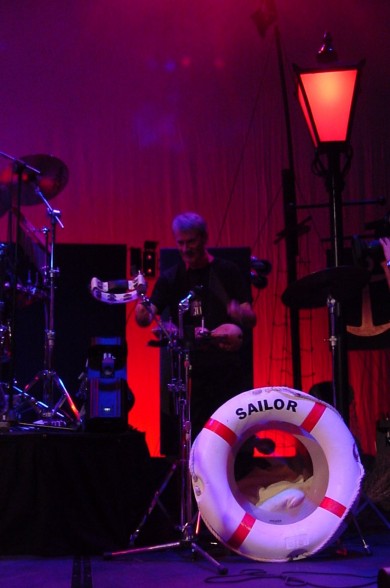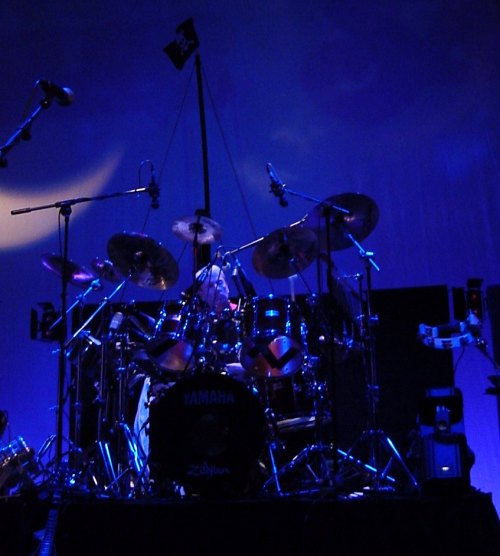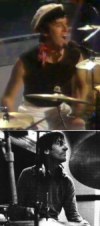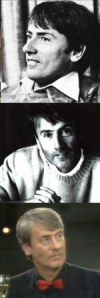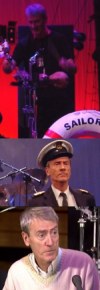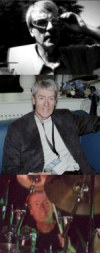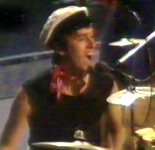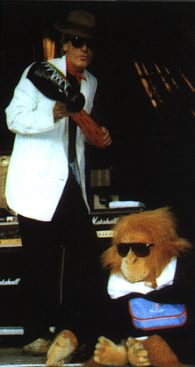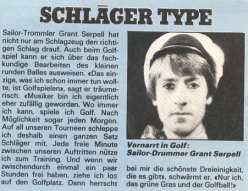|
09 February 1944 |
The legend... taken from the
official SAILOR fanclub biography:
To be born in France in 1944 was to be born into
a world stripped of reason and civilization, hollow and
demoralised after years of the Occupation,
uncomprehending of the meaning of liberation. It was the
world Grant Serpell saw without understanding; it was the
world in which his parents lived in poverty and
hopelessness.
France was a shambles following the Second World War,
both culturally and economically. Serpell's father, a
professor of music at the University of Paris, had been
active in the French Underground. Captured and
imprisoned, he survived the ordeal only to emerge a
broken man. Two long years of rehabilitation in Nantes
served only to convince the elder Serpell that France was
not yet ready for its new sons. In 1949, the family moved
to Montreal.
In Canada, the professor revived; the aura of a new land
was somehow invigorating. Yet the renewal of Serpell's
academic fervour would work strange wonders. In 1951, he
was offered a chair at Cambridge.
Grant Serpell, the child of France, grew up in the
strange world of cloistered British intellectuality.
Influenced, no doubt, by his father, his interest in
music came at an early age. But more than that, Serpell
saw in the mathematical provision of music the basis for
an order of things. He turned his talents toward
imaginative engineering and became an inventor, using his
creative insights to perceive new applications for
everyday needs.
Opting out of academic life, Serpell travelled
extensively throughout Africa and Asia. In 1967, Serpell
arrived in Paris on his way back to England. A friend of
his father's took him to the 'Matelot' where he met
SAILOR. His startling genius with musical precision
fascinated the group. He joined the group as a drummer.
Following the break-up of SAILOR in 1970, Serpell
returned to England. But Paris had become his home. An
aeronautical engineering firm in St. Cloud offered him a
commission to help design a lighter-than-air aircraft.
"It's a gas," he says. "I want to build a
Graf Zeppelin the size of Paraguay and put Onassis on
welfare. And I'll do it, too."
Like most of SAILOR's other members, he was reluctant to
re-assemble the band. "Once is enough. The
recognition and all that star jive just isn't worth the
hassle. But this seems to be for a good cause. The Arts
Association people seem genuine enough. But after this
session, it's back to my balloon, yeah?"
And here's the true story...
with special thanks to James McCarraher:
Stephen Grant
Serpell was born on 09 February 1944 to a Cornish farmer
and a box office booking clerk. Initially taking up the
violin, Grant switched to drums when drummer Ray Cobb
stayed as a house guest.
Pulling together a Heath-Robinson drum kit, Grant joined
his first band at Grammar School and his devoted parents
drove him from gig to gig, perhaps hoping he would take
up something smaller!
Grant moved on to the University of Sussex to study
Chemistry. Presuming this would be the end of his
drumming days, he was surprised to find that he was
thrown into an active social life, co-founding The Jazz
Quartet, playing with The U.S [University of Sussex] Jazz
Trio and supporting other bands due to the drought of
drummers in the area.
Obtaining his degree, Grant went on to join Ice before
drumming with jazz-rock outfit, Affinity. Other acts
Grant worked with included Mike D’Abo and Geno
Washington, before he was invited to join KP Packet, who
later became SAILOR.
The demise of SAILOR in the late Seventies saw Grant
enter into a songwriting partnership before quitting the
business and training as a teacher.
The initial SAILOR reformation excluded Grant since he
had left the business, but the call-up eventually came
from Georg, which he has never forgotten: "When
Georg phoned and asked if I was interested in joining the
band, I was just chuffed to bits."
Grant has never looked back, for many years juggling full
time teaching with SAILOR’s promotional, recording
and touring duties. He still drums for the band and at
Sixty, is the oldest serving member of SAILOR.
© James McCarraher 2004.
A full and detailed account can be found in the book "A Glass Of Champagne – The Official Sailor Story".
Fanclub
letter to the fans
1991
Dear SAILOR Club Member
Is it really eleven years since we worked together ?
When I left SAILOR I felt little inclination to continue
in the music business although I did write a few themes
for TV programmes and also did some songwriting with a
series of Australians (Why Australians?!). My problem was
to find a pleasant way to earn a living while maintaining
the luxury of long holidays and avoiding the grind of
commuting to London.
Education was the obvious answer, so I used my university
degree and studied further to qualify as a secondary
school teacher in chemistry (my degree subject).
Thank goodness, I was pretty good at my job and achieved
rapid promotion to Head of Department, eventually
becoming Director of Studies for the sixth form (16-18
years) in a large comprehensive school.
The demands made upon a teacher are very similar to those
made upon a performing musician, as one can only motivate
if one can create an interest in one's own subject. It
appears that I have this ability and am able to achieve a
cheerful but purposeful atmosphere in my lessons.
It must be said that at various times during my ten years
teaching, I wondered if SAILOR would ever reform, but
when eight years had passed, I decided it was not to be.
How wrong can you get?
Throughout all aspects of my professional life my darling
wife Michelle has been a tower of strength, and thanks to
her my family life has been a source of continual joy. My
children, Edmund and Charlotte, both have university
degrees now and we are very proud of them.
Apart from fulfilling my continuing passion for golf and
also my need to go fishing, I have fulfilled a lifelong
desire to visit Africa, in particular Kenya. The country,
the people and the wildlife are fascinating and Michelle
and I would spend all our spare time there if we could. I
hope that the knowledge of African drum rhythms that I
have acquired will enrich the style of the band and widen
the audience for our music.
It is a real thrill for me to be a member of SAILOR once
again. There is a very special chemistry between the four
of us and I believe that we can rekindle the magic that
existed in the early days of the band, producing what I
know to be a unique brand of musical entertainment.
The road will not be easy but I am sure that with hard
work and dedication we can overcome any adversity that
the music business chooses to throw at us and once again
give pleasure to you, our dedicated fans.
Grant Serpell
Interview
for the DVD "Pirate Copy - Sailor Live In
Concert"
November
2002:
Question: What do you feel that SAILOR can give an audience today?
Grant: Well, exactly the same as they could give 28 years ago. SAILOR when it first started was old-fashioned. The music was based upon a musical that Georg was writing, it was very reflective, very dark, very atmospheric. We tried to produce this sort of nostalgic music, and so the sound of the Nickelodeon, which I'm sure the other members of the band will tell you about, had a very nostalgic feeling. There was nothing groovy about SAILOR whatsoever. I always loved the romanticism, because when SAILOR first started there really was no romanticism in pop music. It was very frustrating when we first started doing videos we wanted to have dark videos and of course we were told 'no, you've got to light it bright', it was all bright blues. And then when Ultravox came along with "Vienna" and did these atmospheric videos we were so frustrated because that's what we wanted, but we weren't allowed to do it.
Question: What type of audiences do you attract now?
Grant: The majority of gigs we do are in Germany, multi-band gigs in Germany with 60s and 70s bands. Therefore it tends to be an average age range from 25 to 45. But in the open air ones you get a lot more youngsters. We've played in Latvia now twice and both times in Latvia we were playing to kids up to 22. It's still a sort of family audience, but this summer we played in Latvia to 8.000 and at least half of them were youngsters. And they loved it.
Question: There has always been a strong creative inspiration within the group. Did you start out deliberately wanting to be different?
Grant: Absolutely. In fact I have to take a certain responsibility for that. I felt by being different we had a greater chance of being successful. Before SAILOR I worked in a band called Affinity and I also played with Mike D'Abo and with Geno Washington and so I've seen what made them different and successful. It's very difficult in the music business and A&R man from the record company would come along and say 'sorry, I can't get you a deal, it's not original enough' and then in the next breath he would say 'sorry, I can't get you a deal, it doesn't fit into the mainstream of what we're doing at the moment'. And so I tried to make us different from other bands. We weren't successful in the UK to start with. Our first album really didn't do very much, but fortunately "Traffic Jam", our first single, was a massive hit in Holland and then the album was massive, it went Gold in Holland very very quickly. On the basis of that they couldn't really drop us. But it was touch and go whether we would make the second album, but fortunately the hits came on the second album.
Question: Mandolins and glockenspiels are not normal instruments on hit records. How difficult was it to incorporate them into the recordings?
Grant: Well, not into the original recordings because they were all played separately. The problem was actually getting them into live performance. That's when the Nickelodeon was developed. So the actual Nickelodeon sound was produced by a combination of a very cheap glockenspiel, tack piano and mandolin, but played separately.
Question: "A Glass Of Champagne" was the highest selling SAILOR single. I think it's the perfect well-crafted three-minute pop song. Do you think it gets the recognition it deserves?
Grant: It's quite interesting, actually, because if you ask people who have heard of SAILOR, what records we made, they will always remember "Girls Girls Girls". But as a name of a record they will not remember "A Glass Of Champagne" because I think "A Glass Of Champagne" is quite an unlikely name for a single. But when you play them the single they say 'oh yes, I remember that, it was a great record'. And so I think people actually don't connect the name "A Glass Of Champagne" with the record. It's worth stating, and I'm sure Georg who wrote it won't mind saying, that it was inspired by Virginia Plain. Georg was so knocked out with Virginia Plain that "A Glass Of Champagne" was a tribute to it.
Question: Do you think that song could have been written today?
Grant: Yes I think so, because in terms of today's music I think that the arrangement probably wouldn't come about, but the structure of the song would come about. It's a very chordy song, but as you say very very simple. And in fact not even a three-minute pop song, I think it's 2.48 or something. In fact the whole of "Trouble", our second album, was less than a half an hour.
Question: What do you remember about the recording of "A Glass Of Champagne"?
Grant: I remember Georg coming in with the backing track on a very small tape recorder, and he said 'I got this backing track' and he started playing it and I said 'Georg, that's a hit record!' We hadn't even heard the song, it was just the backing track which to me sounded like a hit record. The thing is we needed it because the rest of the album had been made, but "Girls Girls Girls", although it has a lot of quality, does not scream hit single actually. It is a standard, especially in Europe, it really is, and in fact in the UK, because "I'm A Celebrity, Get Me Out Of Here" played the whole of it on one of the episodes on a Friday night. But we needed a hit single and when this came in we knew this was the one we were looking for.
Question: Can you actually tell in the studio when your are recording if something is really special, it's really something to happen?
Grant: No, I don't think so. I have no idea. The thing is for me pop music is all about songs, and therefore when you're recording a song in the studio you've heard the song so many times that you must have lost that initial thrill of the song. But equally I have to say that in the studio something magical can happen in terms of arrangement or a producer's idea or even just something that works in the spirit of the moment that could be the difference between a hit and not a hit.
Question: Do you think it's a bonus or a slight confusion that your image falls between the two stools of theatre and rock?
Grant: I think one of the difficulties is the name SAILOR. When we formed we wanted to be a theatrical band, that was absolutely the intention. In the same we say that Genesis was theatrical in that era. But what happened, as soon as we got our record deal the vinyl crisis came along. No one now remembers, but basically what happened was that people said 'there's not enough vinyl left to make records, the record business is going to die', and so, instead of being and album market the record market changed over night to a singles market. We, being a conceptual band, suddenly had to find the single, and this was the problem with the first album. "Traffic Jam" was totally different from the rest of the SAILOR concept, and in fact we didn't necessarily want "Traffic Jam" to be on the first album. But thank goodness it was, otherwise probably the first album wouldn't have sold in Holland.
Question: Do you embrace new music technology at all now?
Grant: Yes, I think we have to. I mean, the Nickelodeon always did embrace music technology. SAILOR never had a bass guitar, the bass has always been a synthesizer, so the original bass sound was an ARP 20600 and on stage the bass sound was produced by an ARP synthesizer and a tack piano and we also had... I'm sure somebody else will tell you about it, a glockenspiel that was operated by the keyboard, using little magnets. But unfortunately it was always about sort of 300 milliseconds behind what we were trying to play and therefore didn't really work very well.
Question: What do you think the successful elements of your singles were that made them really so popular?
Grant: Well, in the UK certainly "A Glass Of Champagne" was just immediately commercial. And "Girls Girls Girls" was just a very interesting, very original song, lyrically very clever, lyrically maybe a bit chauvinistic for today's market, so I don't think "Girls Girls Girls" would be likely to be written these days. But certainly Georg was on a rich fame of writing and I think having three people to work with inspired him and made him write better songs. Plus the fact that, and this will always maintain, that we were on the road performing. I think it's very difficult for writers to sit at home, either in absolute poverty or in absolute luxury, and be inspired and produce wonderful original material. I think being out on the road, listening to the radio, you drive along, you get snatches of other records that you hear in a slightly different way, that can send the creative brain away.
Question: Which of your records are you particularly proud of?
Grant: One of my favourites is "Jacaranda" which I think was the B-side to "A Glass Of Champagne" (a note from MARINERO: no, it was the B-side of "Girls Girls Girls" ;-)), because it's reflective and romantic. But I suppose I have to say that in terms of my well-being it's "A Glass Of Champagne", simply because it was the hit single that made us successful, and without it we wouldn't have been successful and therefore a lot of the other songs would never have been written because they wouldn't have had a chance.
Question: Are there any ambitions left that you want to fulfil?
Grant: Absolutely. I would like us to come up with an absolute brilliant, amazing single that the modern A&R world couldn't say 'no' to and couldn't say 'oh no, you are too old', but 'yes, we've got to go with that because it's so interesting' and then it gets played and then we could start again in the UK. I'd love to play again in the UK, but to a genuine interested market.
